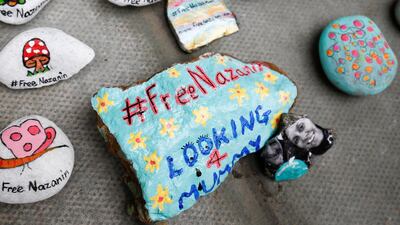An unnamed British-Iranian national has been sentenced to six years in prison on spying charges, the official news agency of Iran’s judiciary reported Sunday, the latest dual national convicted in the country.
Mizan news agency quoted Tehran prosecutor Abbas Jafari Dolatabadi announcing the sentencing, although he did not elaborate on what the charges entailed.
However, there is no known case of a British-Iranian national being sentenced to six years in prison, suggesting this is a new case.
Britain’s Foreign Office did not immediately respond to a request for comment late Sunday night.
A number of dual nationals with Western ties have been arrested since Iran’s 2015 nuclear deal with world powers.
Analysts and family members of dual nationals and others detained in Iran have suggested that hard-liners in the Islamic Republic’s security agencies use the prisoners as bargaining chips for money or influence.
A UN panel in September described “an emerging pattern involving the arbitrary deprivation of liberty of dual nationals” in Iran, which Tehran denies.
Iran does not recognise dual nationalities, so those detainees cannot receive consular assistance.
Others with ties to the West detained in Iran include Nazanin Zaghari-Ratcliffe, a British-Iranian woman serving a five-year prison sentence for allegedly planning the “soft toppling” of Iran’s government while traveling with her young daughter.
Mrs Zaghari-Ratcliffe was detained in April 2016 and served a third of her sentence by January 2018, making her eligible for release. However, she remains in an Iranian jail notorious for its harsh conditions.
Her family says Mrs Zaghari-Ratcliffe remains held as Britain negotiates a settlement with Iran over £400 million held by London, a payment the late Iranian Shah Mohammad Reza Pahlavi made for Chieftain tanks that were never delivered.
Meanwhile, the BBC said on Sunday that it is appealing to the United Nations to protect the human rights of its journalists and their families as Iranian authorities escalate “years of persecution and harassment”.
The unprecedented move follows its own unheeded calls to Tehran to end the harassment of staff working for the British broadcaster’s Persian Service, according to BBC director general Tony Hall.
“The BBC is taking the unprecedented step of appealing to the United Nations because our own attempts to persuade the Iranian authorities to end their harassment have been completely ignored,” Mr Hall said in a statement.
“In fact, during the past nine years, the collective punishment of BBC Persian Service journalists and their families has worsened.”
Lawyers for the BBC World Service in October filed an urgent appeal to UN special rapporteurs on behalf of its Persian Service staff.
BBC journalists will now try to increase the pressure on member states for support by addressing a UN Human Rights Council session this week, the corporation said.
It will also hold a series of events organised in conjunction with the International Federation of Journalists to highlight the fraught situation, including holding a press conference on Monday.
“This is not just about the BBC – we are not the only media organisation to have been harassed or forced to compromise when dealing with Iran,” said Mr Hall.
“We are now asking the community of nations at the UN to support the BBC and uphold the right to freedom of expression.”
The BBC said its Persian satellite television service journalists in London and their families in Iran have been “systematically targeted” since it launched in 2009.
The harassment escalated last year, when Iranian authorities began a criminal investigation, alleging the journalists' work was “a crime against Iran’s national security”, according to the BBC.
Tehran has also launched an asset-freezing injunction citing 152 named individuals, mainly current and former BBC Persian staff, which has prevented them from buying or selling property in Iran, it said.

